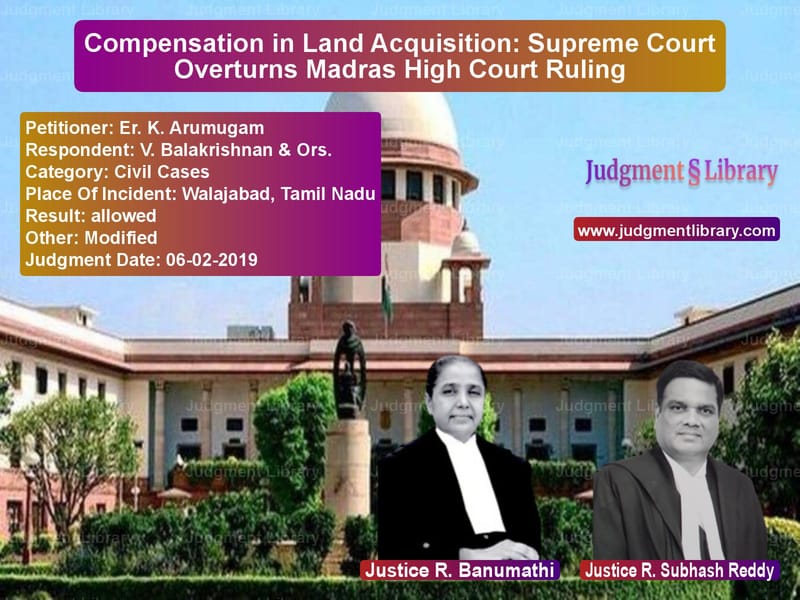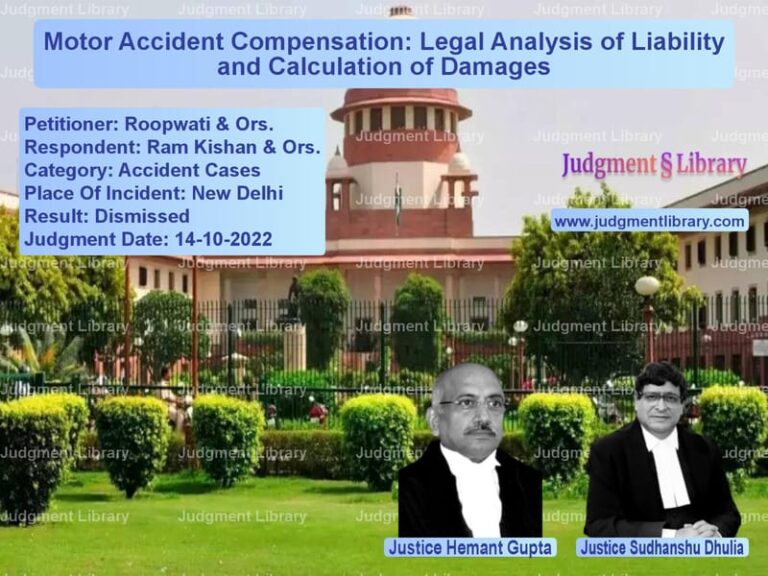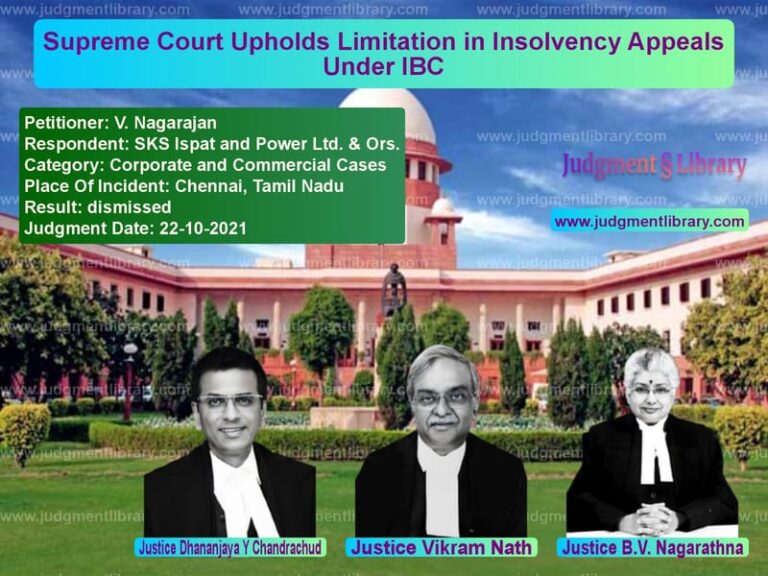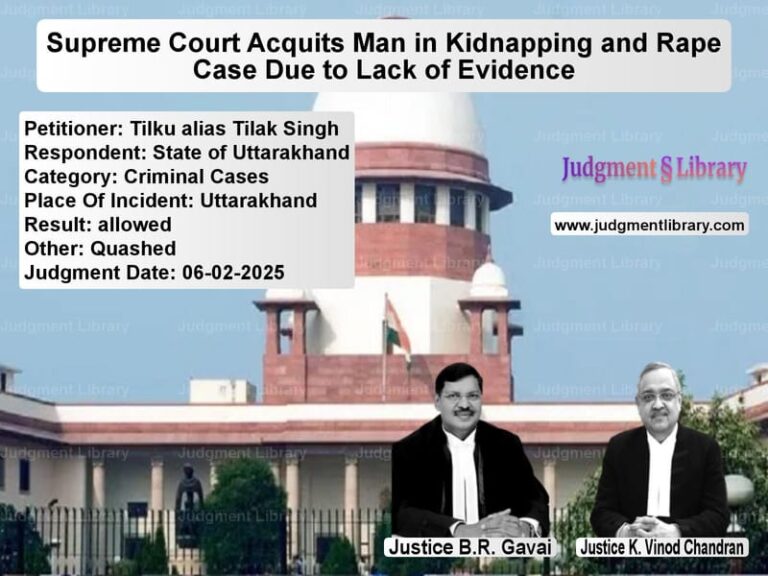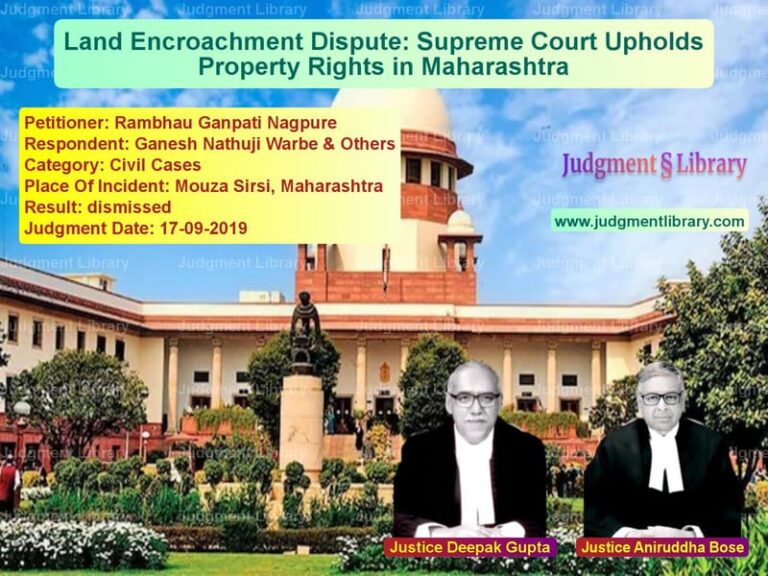Compensation in Land Acquisition: Supreme Court Overturns Madras High Court Ruling
The Supreme Court of India recently ruled in the case of Er. K. Arumugam v. V. Balakrishnan & Ors., setting aside a contempt order issued by the Madras High Court regarding the compensation for land acquired by the Tamil Nadu Water Supply and Drainage (TWAD) Board. The case revolves around the long-standing dispute over fair compensation for land utilized by the TWAD Board in 1991, culminating in a legal battle over the quantum of compensation to be paid to the landowner.
Background of the Case
The dispute began in 1991-1992 when the TWAD Board took possession of 86.5 cents of land in Walajabad Village, Tamil Nadu, with the consent of the landowner, V. Balakrishnan, to construct Headworks and staff quarters. In 1993, construction was completed, and the property was used for public purposes.
Despite the acquisition, no formal compensation was determined for decades. In 2015, the District Collector, Kancheepuram, finally set the value of the land at Rs. 260 per cent, amounting to Rs. 2,43,001 after applying an annual increase. The TWAD Board issued a demand draft for this amount, which the landowner refused.
Legal Proceedings
High Court Orders Compensation
Aggrieved by the low compensation, Balakrishnan filed Writ Petition No. 3874 of 2016 before the Madras High Court. On February 3, 2016, the High Court directed the TWAD Board to work with the District Collector to ensure a fair and reasonable compensation within two months.
In response, the TWAD Board sought clarification and a recommendation from the District Collector. After deliberation, the Collector fixed the compensation at Rs. 200 per square foot, considering the 2012 guideline value. This calculation resulted in a total compensation of Rs. 1,11,80,723, which was paid to Balakrishnan.
Contempt Petition Filed
Dissatisfied with the compensation, Balakrishnan filed Contempt Petition No. 2626 of 2016, alleging non-compliance with the High Court’s directions. The High Court, in response, fixed a revised compensation of Rs. 600 per square foot and ordered the TWAD Board to pay the balance within four weeks.
TWAD Board challenged this ruling, arguing that it had already complied with the earlier High Court order by ensuring a fair valuation through the District Collector.
Arguments Before the Supreme Court
Petitioner’s Arguments (TWAD Board)
- The Board had followed due process and paid the landowner as per the District Collector’s valuation.
- The High Court overstepped its jurisdiction by arbitrarily fixing compensation under contempt proceedings.
- The increase from Rs. 200 to Rs. 600 per square foot was excessive and would impose an undue financial burden on public funds.
Respondent’s Arguments (Balakrishnan)
- The compensation determined was unfairly low considering the land’s current value.
- The High Court had the authority to ensure fair compensation under contempt jurisdiction.
- The Board had delayed in paying a just price for the land for over two decades.
Supreme Court’s Observations
The Supreme Court examined whether the High Court had exceeded its jurisdiction in the contempt proceedings. Key observations included:
- On Contempt Jurisdiction: The Court held that contempt jurisdiction cannot be used to pass new orders that alter an original ruling. The High Court was only required to ensure compliance with its earlier directive, not determine new compensation.
- On Compensation Fixation: The Supreme Court emphasized that land valuation should be based on due process, not arbitrary court determinations. The Collector’s assessment, based on official guidelines, was reasonable.
- On Public Funds: The Court cautioned against imposing excessive financial burdens on public bodies, noting that Rs. 600 per square foot would amount to more than Rs. 4 crore, which was unjustified.
The Court quoted from a previous judgment:
“The power vested in the High Court under contempt proceedings is not to be exercised beyond the four corners of the original order. Decided issues cannot be reopened, and the court cannot alter the compensation fixed through an administrative process.”
Final Verdict
The Supreme Court ruled in favor of the TWAD Board, setting aside the High Court’s order. The Court concluded:
- The Board had complied with the original High Court order.
- The High Court’s increase in compensation under contempt proceedings was unlawful.
- The landowner was entitled to Rs. 200 per square foot, as determined by the District Collector.
Key Takeaways
- Judicial Overreach in Contempt Proceedings: Courts must refrain from modifying substantive orders in contempt cases.
- Fair Land Acquisition Compensation: Compensation should be determined through due process rather than arbitrary court orders.
- Public Funds Protection: The ruling safeguards government resources from undue financial liabilities.
Conclusion
The Supreme Court’s ruling in this case sets an important precedent for land acquisition disputes. It reinforces that judicial intervention should be limited to ensuring compliance with existing orders and not be used to impose new obligations. The decision balances the rights of landowners with the financial responsibilities of public bodies, ensuring a fair and legally sound compensation process.
Petitioner Name: Er. K. Arumugam.Respondent Name: V. Balakrishnan & Ors..Judgment By: Justice R. Banumathi, Justice R. Subhash Reddy.Place Of Incident: Walajabad, Tamil Nadu.Judgment Date: 06-02-2019.
Don’t miss out on the full details! Download the complete judgment in PDF format below and gain valuable insights instantly!
Download Judgment: Er. K. Arumugam vs V. Balakrishnan & Or Supreme Court of India Judgment Dated 06-02-2019.pdf
Direct Downlaod Judgment: Direct downlaod this Judgment
See all petitions in Property Disputes
See all petitions in Contract Disputes
See all petitions in Landlord-Tenant Disputes
See all petitions in Judgment by R. Banumathi
See all petitions in Judgment by R. Subhash Reddy
See all petitions in allowed
See all petitions in Modified
See all petitions in supreme court of India judgments February 2019
See all petitions in 2019 judgments
See all posts in Civil Cases Category
See all allowed petitions in Civil Cases Category
See all Dismissed petitions in Civil Cases Category
See all partially allowed petitions in Civil Cases Category

